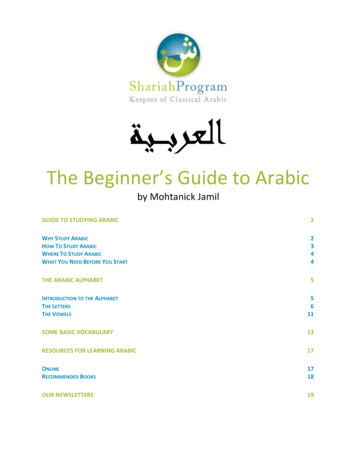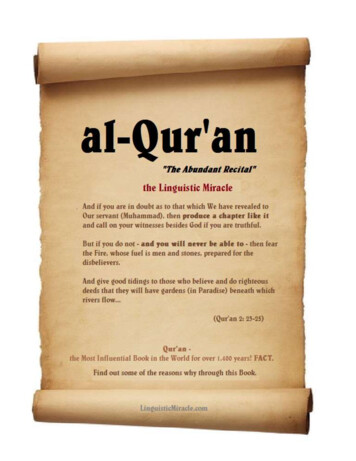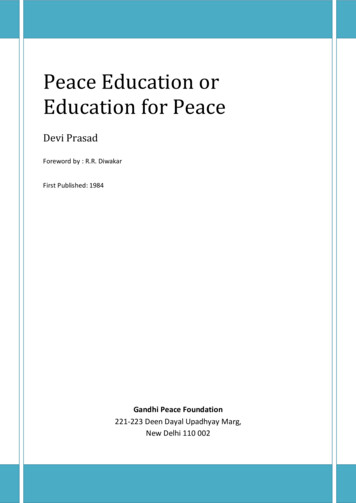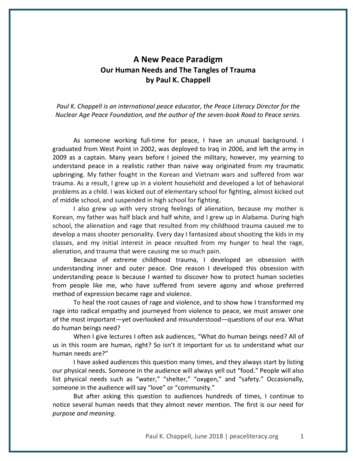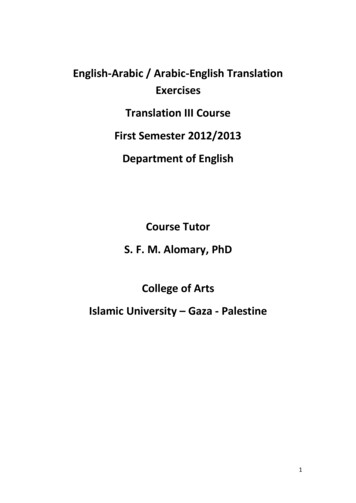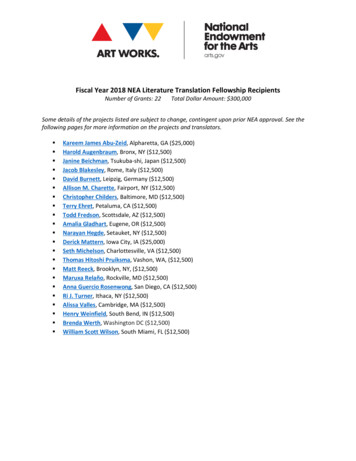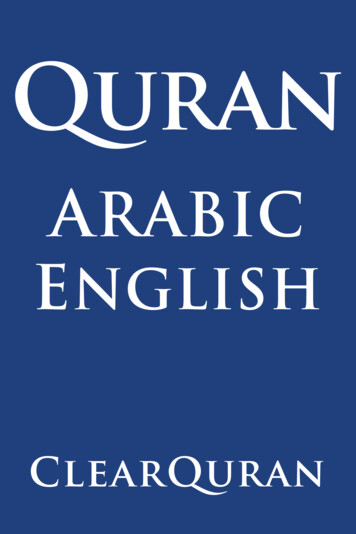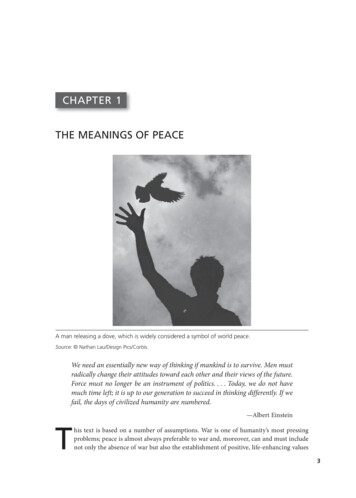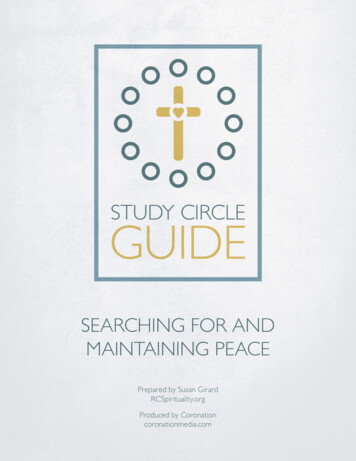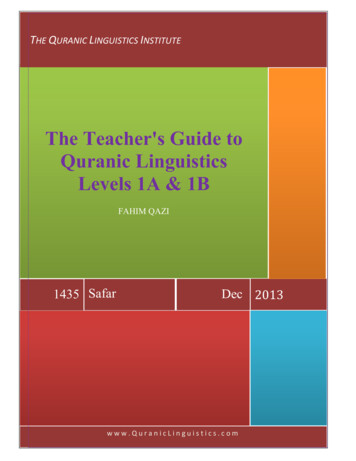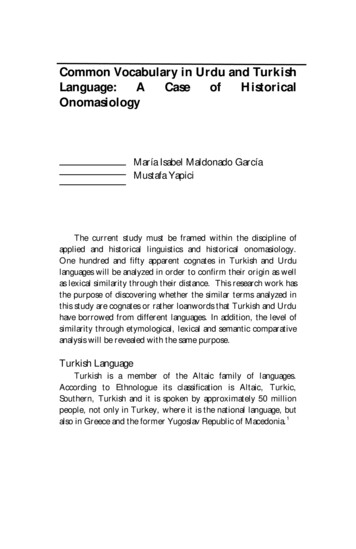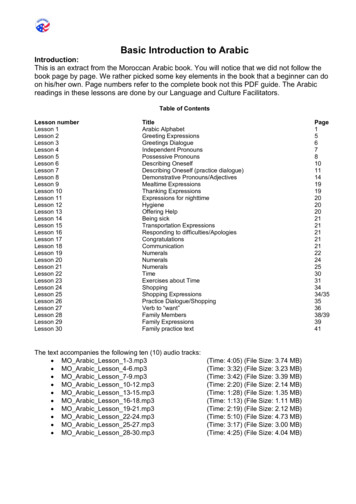
Transcription
Basic Introduction to ArabicIntroduction:This is an extract from the Moroccan Arabic book. You will notice that we did not follow thebook page by page. We rather picked some key elements in the book that a beginner can doon his/her own. Page numbers refer to the complete book not this PDF guide. The Arabicreadings in these lessons are done by our Language and Culture Facilitators.Table of ContentsLesson numberLesson 1Lesson 2Lesson 3Lesson 4Lesson 5Lesson 6Lesson 7Lesson 8Lesson 9Lesson 10Lesson 11Lesson 12Lesson 13Lesson 14Lesson 15Lesson 16Lesson 17Lesson 18Lesson 19Lesson 20Lesson 21Lesson 22Lesson 23Lesson 24Lesson 25Lesson 26Lesson 27Lesson 28Lesson 29Lesson 30TitleArabic AlphabetGreeting ExpressionsGreetings DialogueIndependent PronounsPossessive PronounsDescribing OneselfDescribing Oneself (practice dialogue)Demonstrative Pronouns/AdjectivesMealtime ExpressionsThanking ExpressionsExpressions for nighttimeHygieneOffering HelpBeing sickTransportation ExpressionsResponding to NumeralsNumeralsNumeralsTimeExercises about TimeShoppingShopping ExpressionsPractice Dialogue/ShoppingVerb to “want”Family MembersFamily ExpressionsFamily practice textThe text accompanies the following ten (10) audio tracks: MO Arabic Lesson 1-3.mp3 MO Arabic Lesson 4-6.mp3 MO Arabic Lesson 7-9.mp3 MO Arabic Lesson 10-12.mp3 MO Arabic Lesson 13-15.mp3 MO Arabic Lesson 16-18.mp3 MO Arabic Lesson 19-21.mp3 MO Arabic Lesson 22-24.mp3 MO Arabic Lesson 25-27.mp3 MO Arabic Lesson 28-30.mp3(Time: 4:05) (File Size: 3.74 MB)(Time: 3:32) (File Size: 3.23 MB)(Time: 3:42) (File Size: 3.39 MB)(Time: 2:20) (File Size: 2.14 MB)(Time: 1:28) (File Size: 1.35 MB)(Time: 1:13) (File Size: 1.11 MB)(Time: 2:19) (File Size: 2.12 MB)(Time: 5:10) (File Size: 4.73 MB)(Time: 3:17) (File Size: 3.00 MB)(Time: 4:25) (File Size: 4.04 34/35353638/393941
Peace Corps / Morocco Page 1Lesson 1Arabic AlphabetArabic Basic Lessons, Peace Corps/Morocco2
Peace Corps / Morocco Page 5Lesson 2Greeting expressions and appropriate responses ﻋﻠَﻴﻜُﻢ َ اﻟﺴَﻼ ُم ﻋﻠَﻴﻜُﻢ اﻟﺴَﻼم َ َو A: Peace be upon youB: And peace be upon you (too)s-salamu ع alaykumwa ع alaykum s-salamA: Good morningB: Good morningṣbaн l-xirṣbaн l-xir ﺻﺒﺎح اﻟﺨﻴﺮ ﺻﺒﺎح اﻟﺨﻴﺮ A: Good afternoon / eveningB: Good afternoon / eveningmsa l-xirmsa l-xir ﻣﺴﺎ اﻟﺨﻴﺮ ﻣﺴﺎ اﻟﺨﻴﺮ namesmiyaWhat’s your name?šnu smitk?my name.smiti. ﺳﻤﻴﺘﻲ your name.smitk. ﺳﻤﻴﺘﻚ his name.smitu. ﺳﻤﻴﺘﻮ her name.smitha. ﺳﻤﻴﺘﻬﺎ Nice to meet you.mtšrfin ﻣﺘﺸﺮﻓﻴﻦ How are you (masc.)?kif dayr? آﻴﻒ داﻳﺮ؟ How are you (fem.)?kif dayra? آﻴﻒ داﻳﺮة؟ Are you fine?labas?Good, thanks be to God.labas, l-нamdullahGood, thanks be to God.bixir, l-нamdullahEverything is fine.kulši bixir آُﻠﺸﻲ ﺑِﺨﻴﺮ Good-byebslama ب اﻟﺴﻼﻣﺔ Good nightlayla sa ع ida ﻟَﻴﻠﺔ ﺳﻌﻴﺪة Arabic Basic Lessons, Peace Corps/Morocco ﺳﻤﻴﺔ ﺷﻨﻮ ﺳﻤﻴﺘﻚ؟ ﻻ ﺑﺎس؟ ﻻ ﺑﺎس اﻟﺤَﻤ ُﺪ اﷲ ﺑِﺨﻴﺮ اﻟﺤَﻤ ُﺪ اﷲ 3
Peace Corps / Morocco Page 6Lesson 3Greetings DialogueJohn: s-salamu ع alaykum.Mohamed: wa ع alaykum s-salam.John: kif dayr?Mohamed: labas, l-нamdullah. u nta?John: bixir, l-нamdullah.Mohamed: šnu smitk?John: smiti John. u nta?Mohamed: smiti Mohamed.John: mtšrfin.Mohamed: mtšrfin.Arabic Basic Lessons, Peace Corps/Morocco ﻋﻠَﻴﻜُﻢ َ اﻟﺴَﻼ ُم ﻋﻠَﻴﻜُﻢ اﻟﺴَﻼم َ َو آﻴﻒ داﻳﺮ؟ و ﻧﺖَ؟ . ﻻ ﺑﺎس اﻟﺤَﻤ ُﺪ اﷲ ﺑِﺨﻴﺮ اﻟﺤَﻤ ُﺪ اﷲ ﺷﻨﻮ ﺳﻤﻴﺘﻚ؟ و ﻧﺖَ؟ . ﺳﻤﻴﺘﻲ دﺟﻮن ﺳﻤﻴﺘﻲ ﻣﺤﻤﺪ ﻣﺘﺸﺮﻓﻴﻦ ﻣﺘﺸﺮﻓﻴﻦ : دﺟﻮن : ﻣﺤﻤﺪ : دﺟﻮن : ﻣﺤﻤﺪ : دﺟﻮن : ﻣﺤﻤﺪ : دﺟﻮن : ﻣﺤﻤﺪ : دﺟﻮن : ﻣﺤﻤﺪ 4
Peace Corps / Morocco Page7Lesson 4Independent PronounsWe call the following pronouns “independent” because they are not attached to other words, such asnouns, verbs, or prepositions. The pronouns are often used in a number of different ways.Iana أﻧﺎ you (masc. singular)nta ﺖ َ ﻧ you (fem. singular)nti ﺖ ِ ﻧ hehuwa ُه َﻮ shehiya ﻲ َ ِه weнna ﺣﻨﺎ you (plural)ntuma ﻧﺘُﻤﺎ theyhuma هُﻤﺎ Arabic Basic Lessons, Peace Corps/Morocco5
Peace Corps / Morocco Page 8Lesson 5Possessive PronounsIn Darija, a suffix (ending) may be added to the end of words in order to express possession. ـﻴﺎ / ـﻲ myi / yaT*your (singular)khisu / hT *herha ـﻬﺎ ourna ـﻨﺎ your (plural)kum ـﻜُﻢ theirhum ـﻬُﻢ ـﻚ ـﻪ / ـﻮ * For the “my” and “his” forms, the first ending is used for words ending in consonants, whilethe second is used with words ending in vowels. For example, smiti (my name), but xuya (mybrother).Example of possessive pronouns with the noun “book.”bookktabmy bookktabiyour (sing.) bookktabkhis bookktabuher bookktabhaour bookktabnayour (plur.) bookktabkumtheir bookktabhumArabic Basic Lessons, Peace Corps/Morocco آﺘﺎب آﺘﺎﺑﻲ آﺘﺎﺑﻚ آﺘﺎﺑﻮ آﺘﺎﺑﻬﺎ آﺘﺎﺑﻨﺎ آﺘﺎﺑﻜُﻢ آﺘﺎﺑﻬُﻢ 6
Peace Corps / Morocco Page 10Lesson 6Describing Oneself:Nationalities, Cities, and Marital StatusVocabulary and ExpressionsWhere are you (masc.) from?mnin nta?Where are you (fem.) from?mnin nti?I am from the U.S.ana mn mirikan.I am American.ana mirikani(ya).I am from Morocco.ana mn l-mġrib.I am Moroccan.ana mġribi(ya).Are you . ?weš nta/nti . ?Are you from the U.S.?weš nta/nti mn mirikan?Where are you from in the U.S.?mnin nta/nti f mirikan?And you?u nta/nti?citymdinastatewilayabig (fem.)kbirasmall (fem.)ṣġiraExcuse me. (to man / woman)smн li / smнi liI am not .ana maši .butwelakinengaged (fem.)mxṭubamarried (masc. / fem.)mzuwj / mzuwjaNo, not yet.lla mazal / lla baqiAre you a tourist?weš nta/nti turist? ﻣﻨﻴﻦ ﻧﺖَ؟ ﻣﻨﻴﻦ ﻧﺖِ؟ . أﻧﺎ ﻣﻦ ﻣِﺮﻳﻜﺎن .( أﻧﺎ ﻣِﺮﻳﻜﺎﻧﻲ)ة . أﻧﺎ ﻣﻦ اﻟﻤﻐﺮِب .( أﻧﺎ ﻣﻐﺮِﺑﻲ)ة ؟ . ﺖ ِ ﻧ / ﺖ َ واش ﻧ ﺖ ﻣﻦ ِﻣﺮﻳﻜﺎن؟ ِ ﻧ / ﺖ َ واش ﻧ ﺖ ف ﻣِﺮﻳﻜﺎن؟ ِ ﻧ / ﺖ َ ﻣﻨﻴﻦ ﻧ ﻧﺖِ؟ / ﺖ َ وﻧ ﻣﺪﻳﻨﺔ وِﻻﻳﺔ آﺒﻴﺮة ﺻﻐﻴﺮة ﺳﻤﺤﻲ ﻟﻲ / ﺳﻤﺢ ﻟﻲ . أﻧﺎ ﻣﺎﺷﻲ َوَﻟﻜِﻦ ﻣﺨﻄﻮﺑﺔ ﻣﺰوّﺟﺔ / ﻣﺰوّج ﻻ ﺑﺎﻗﻲ ّ / ﻻ ﻣﺎزال ّ ﺖ ﺗُﺮﻳﺴﺖ؟ ِ ﻧ / ﺖ َ واش ﻧ I work with the Peace Corps.ana xddam(a) m ع a hay'ats-salam. أﻧﺎ ﺧﺪّام)ة( ﻣ َﻊ هَﻴﺌَﺔ اﻟﺴَﻼم Arabic Basic Lessons, Peace Corps/Morocco7
Peace Corps / Morocco Page 11Lesson 7DialogueFatima:Tom:Fatima:Tom:Fatima:Tom:s-salamu ع alaykum.wa ع alaykum s-salam.smн li, weš nta fransawi?lla, ana mirikani.mnin f mirikan?mn mdint Seattle f wilayat Washington.u nti?Fatima:Tom:Fatima:Tom:Fatima:Tom:Fatima:Tom:mn Rabat.šнal f ع mrk?tnayn u ع šrin ع am. u nta?rb ع a u tlatin ع am.weš nta mzuwj wlla mazal?mazal. u nti?lla, baqiya. weš nta turist?lla, ana xddam m ع ahay'at s-salam.Fatima: bslama.Tom: n-šufk mn b ع d.Arabic Basic Lessons, Peace Corps/Morocco ﻋﻠَﻴﻜُﻢ َ اﻟﺴَﻼ ُم ﻋﻠَﻴﻜُﻢ اﻟﺴَﻼم َ َو ﺖ ﻓﺮَﻧﺴﺎوي؟ َ واش ﻧ ، ﺳﻤﺢ ﻟﻲ . أﻧﺎ ﻣِﺮﻳﻜﺎﻧﻲ ، ﻻ ﻣﻨﻴﻦ ف ﻣِﺮﻳﻜﺎن؟ و . ﻣﻦ ﻣﺪﻳﻨﺔ ﺳﻴﺎﺗﻞ ف وِﻻﻳﺔ واﺷﻨﻄُﻦ ﻧﺖِ؟ . ﻣﻦ اﻟﺮﺑﺎط ﺷﺤﺎل ف ﻋﻤﺮك؟ و ﻧﺖَ؟ . ﺗﻨَﻴﻦ و ﻋﺸﺮﻳﻦ ﻋﺎم . رﺑﻌﺔ و ﺗﻼﺗﻴﻦ ﻋﺎم ﻻ ﻣﺎزال؟ ّ ﺖ ﻣﺰوج و َ واش ﻧ و ﻧﺖِ؟ . ﻣﺎزال ﺖ ﺗﻮرﻳﺴﺖ؟ َ واش ﻧ . ﺑﺎﻗﻴﺔ ، ﻻ : ﻓﺎﻃِﻤﺔ : ﻃﻮم : ﻓﺎﻃِﻤﺔ : ﻃﻮم : ﻓﺎﻃِﻤﺔ : ﻃﻮم : ﻓﺎﻃِﻤﺔ : ﻃﻮم : ﻓﺎﻃِﻤﺔ : ﻃﻮم : ﻓﺎﻃِﻤﺔ : ﻃﻮم : ﻓﺎﻃِﻤﺔ . أﻧﺎ ﺧﺪّام ﻣ َﻊ هَﻴﺌَﺔ اﻟﺴَﻼم ، ﻻ : ﻃﻮم . ب اﻟﺴﻼﻣﺔ : ﻓﺎﻃِﻤﺔ . ﻧﺸﻮﻓﻚ ﻣﻦ ﺑﻌﺪ : ﻃﻮم 8
Peace Corps / Morocco P a ge 1 4Lesson 8Demonstrative Adjectives & Demonstrative PronounsDemonstrative Pronounsthis (masc.)hada هَﺪا this (fem.)hadi هَﺪي these (plur.)hadu هَﺪو that (masc.)hadak هَﺪاك that (fem.)hadik هَﺪﻳﻚ those (plur.)haduk هَﺪوك These forms may be used at the beginning of a sentence, in the middle or at the end of a sentence, orin questions. In Arabic, these pronouns can represent people.This is a chair.hada kursi.This is a table.hadi ṭbla.This is Abdallah.hada Abdallah.This is Aicha.hadi Aicha.What’s this? (masc. object)šnu / aš hada?What’s this? (fem. object)šnu / aš hadi?Who is this? (masc.)škun hada?Who is this? (fem.)škun hadi?What is that? (masc. object)šnu / aš hadak?Who is that? (fem.)škun hadik?. هَﺪا آُﺮﺳﻲ . هَﺪي ﻃﺒﻠﺔ . هَﺪا ﻋﺒﺪاﷲ . هَﺪي ﻋﻴﺸﺔ أش هَﺪا؟ / ﺷﻨﻮ أش هَﺪي؟ / ﺷﻨﻮ ﺷﻜﻮن هَﺪا؟ ﺷﻜﻮن هَﺪي؟ أش هَﺪاك؟ / ﺷﻨﻮ ﺷﻜﻮن هَﺪﻳﻚ؟ Demonstrative Adjectivesthis/these (masc. / fem. / plur.)had هَﺪ that (masc.)dak داك that (fem.)dik دﻳﻚ those (plur.)duk دوك Arabic Basic Lessons, Peace Corps/Morocco9
Peace Corps / Morocco Page19Lesson 9Mealtime ExpressionsIn the name of God (said when youbegin an activity: eating, drinking,working, studying, traveling, etc.).bismillahThanks to God (said after finishing ameal, or after expressing that all is wellin life).l-нamdullahI don’t eat . �utd-djajI drink tea / coffee without sugar. kan-šrb atay / l-qhwa bla skkar. ﺑِﺴ ِﻢ اﷲ اﻟﺤَﻤ ُﺪ اﷲ اﻟﺤﻮت / اﻟﺒﻴﺾ / ﻣﺎ آَﻨﺎآﻠﺶ اﻟﻠﺤﻢ . اﻟﺪﺟﺎج /. اﻟﻘﻬﻮة ﺑﻼ ﺳﻜَﺮ / آَﻨﺸﺮب أﺗﺎي . آَﻨﺎآﻞ آُﻠﺸﻲ I eat everything.kan-akul kulši.I eat vegetables only.kan-akul ġir l-xoḍra.I don’t feel like eating.ma-fiya ma-y-akul.I want just/only .bġit ġir .I don’t want to have breakfast.ma-bġit-š n-fṭr. ﻣﺎ ﺑﻐﻴﺘﺶ ﻧﻔﻄﺮ The food is delicious.l-makla bnina. اﻟﻤﺎآﻠﺔ ﺑﻨﻴﻨﺔ I’m full.šb ع t.I want to learn how to cook.bġit n-t ع llm n-ṭiyb.May God replenish / reward you. lla y-xlf.(said after a meal to thank host). آَﻨﺎآﻞ ﻏﻴﺮ اﻟﺨﻀﺮة . ﻣﺎ ﻓﻴّﺎ ﻣﺎ ﻳﺎآُﻞ . ﺑﻐﻴﺖ ﻏﻴﺮ . ﺷﺒﻌﺖ . ﺑﻐﻴﺖ ﻧﺘﻌﻠّﻢ ﻧﻄﻴّﺐ . اﷲ ﻳﺨﻠﻒ To your health (said to someoneafter eating, drinking, coming out of thehammam, wearing new clothes, havinga hair cut, etc.)May God grant you health too.(response to the above)bṣsн̣ нa.lla y- ع tik ṣsн̣ нaArabic Basic Lessons, Peace Corps/Morocco. ب اﻟﺼﺤّﺔ . اﷲ ﻳﻌﻄﻴﻚ اﻟﺼﺤّﺔ 10
Peace Corps / Morocco Lesson 10Thanking ExpressionsThank you.šukran. ﺷُﻜﺮًا You’re welcome.bla jmil. ﺑﻼ ﺟﻤﻴﻞ Page 20Lesson 11Expressions for Nighttime / SleepingI’m tired. (male speaker)ana ع iyan. أﻧﺎ ﻋﻴّﺎن I’m tired. (female speaker)ana ع iyana. أﻧﺎ ﻋﻴّﺎﻧﺔ I want to read a little bit.bġit n-qra šwiya.I want to go to bed.bġit n-n ع s.Where I am going to sleep?fin ġadi n-n ع s.Excuse me, I want to go to bed.smнu li, bġit n-mši n-n ع s.(addressing a group of people). ﺑﻐﻴﺖ ﻧﻘﺮى ﺷﻮﻳﺔ . ﺑﻐﻴﺖ ﻧّﻌﺲ ﻓﻴﻦ ﻏﺎدي ﻧّﻌﺲ؟ . ﺑﻐﻴﺖ ﻧﻤﺸﻲ ﻧّﻌﺲ ، ﺳﻤﺤﻮ ﻟﻲ I want to go to bed early.bġit n-n ع s bkri. ﺑﻐﻴﺖ ﻧّﻌﺲ ﺑﻜﺮي I want to get up early.bġit n-fiq bkri. ﺑﻐﻴﺖ ﻧﻔﻴﻖ ﺑﻜﺮي I want a blanket.bġit waнd l-manṭa. ﺑﻐﻴﺖ واﺣﺪ اﻟﻤﺎﻧﻄﺔ Lesson 12Hygiene/Cleanliness ExpressionsI want to wash my hands withsoap.bġit n-ġsl yddi b ṣ-ṣabun.I want to brush my teeth.bġit n-ġsl snani. ﺑﻐﻴﺖ ﻧﻐﺴﻞ ﺳﻨﺎﻧﻲ I want hot water, please.bġit l-ma s-sxun ع afak. ﺑﻐﻴﺖ اﻟﻤﺎ اﻟﺴﺨﻮن I want to take a shower.bġit n-duwš.I want to go to the hammam.bġit n-mši l-нmmam. ﺑﻐﻴﺖ ﻧﻤﺸﻲ اﻟﺤﻤّﺎم I want to change my clothes.bġit n-bddl нwayji. ﺑﻐﻴﺖ ﻧﺒﺪّل ﺣﻮاﻳﺠﻲ Where is the toilet?fin bit l-ma?I want to do laundry.bġit n-ṣbbn нwayji.Where can I do laundry?fin ymkn n-ṣbbn нwayji.Arabic Basic Lessons, Peace Corps/Morocco. ﺑﻐﻴﺖ ﻧﻐﺴﻞ ﻳﺪّي ب اﻟﺼﺎﺑﻮن . ﺑﻐﻴﺖ ﻧﺪوّش ﻓﻴﻦ ﺑﻴﺖ اﻟﻤﺎ؟ . ﺑﻐﻴﺖ ﻧﺼﺒّﻦ ﺣﻮاﻳﺠﻲ . ﻓﻴﻦ ﻳﻤﻜﻦ ﻧﺼﺒّﻦ ﺣﻮاﻳﺠﻲ 11
Peace Corps / Morocco Lesson 13Offering Help / Asking for FavorsCan I help you?weš n- ع awnk?Excuse me. (to a man)smн li. ﺳﻤﺢ ﻟﻲ Excuse me. (to a woman)smнi li. ﺳﻤﺤﻲ ﻟﻲ Give me . please. ع ṭini . ع afak. واش ﻧﻌﺎوﻧﻚ؟ . ﻋَﻔﺎك . ﻋﻄﻴﻨﻲ Page 21Lesson 14Being SickI’m sick. (male speaker)ana mriḍ. أﻧﺎ ﻣﺮﻳﺾ I’m sick. (female speaker)ana mriḍa. أﻧﺎ ﻣﺮﻳﻀﺔ I want to rest a bit.bġit n-rtaн swiya.Do you feel better?briti šwiya?. ﺑﻐﻴﺖ ﻧﺮﺗﺎح ﺳﻮﻳّﺔ ﺑﺮﻳﺘﻲ ﺷﻮﻳّﺔ؟ Lesson 15Transportation ExpressionsI want to go to .bġit n-mši l . ﺑﻐﻴﺖ ﻧﻤﺸﻲ ل Take me to . please.ddini l . ع afak. ﻋَﻔﺎك . دّﻳﻨﻲ ل Stop here, please.wqf hna ع afak. وﻗﻒ هﻨﺎ ﻋَﻔﺎك Is the meter on?weš l-kuntur xddam? واش اﻟﻜﻮﻧﺘﻮر ﺧﺪّام؟ Turn on the meter, please.xddm l-kuntur ع afak. ﺧﺪّم اﻟﻜﻮﻧﺘﻮر ﻋَﻔﺎك Lesson 16Responses to Problems/Difficulties/ApologiesIt’s not a problem.maši muškil.There is no problem.ma-kayn muškil.Arabic Basic Lessons, Peace Corps/Morocco. ﻣﺎﺷﻲ ﻣُﺸﻜِﻞ . ﻣﺎ آﺎﻳﻦ ﻣُﺸﻜِﻞ 12
Peace Corps / Morocco Lesson 17Congratulations ﻣﺒﺮوك Congratulations.mbrukHappy holiday.mbruk l- ع id. ﻣﺒﺮوك اﻟﻌﻴﺪ May God grant you grace.lla y-bark fik. اﷲ ﻳﺒﺎرك ﻓﻴﻚ (response to the above)Lesson 18CommunicationI don’t understand.ma-fhmt-š. ﻣﺎ ﻓﻬﻤﺘﺶ I don’t know.ma-n- ع rf. ﻣﺎ ﻧﻌﺮف Slowly please.b šwiya ع afak.Repeat please. (to a man) ع awd ع afak. ﻋﺎود ﻋَﻔﺎك Repeat please. (to a woman) ع awdi ع afak. ﻋﺎودي ﻋَﻔﺎك What did you say?šnu glti?Arabic Basic Lessons, Peace Corps/Morocco. ب ﺷﻮﻳﺔ ﻋَﻔﺎك ﺷﻨﻮ ﮔﻠﺘﻲ؟ 13
Peace Corps / Morocco Page 22Lesson 19NumeralsNumbers 1 thru 10In Moroccan Arabic, there are two ways to combine the numbers 3 through 10 with an object. Wesometimes use the “full” or normal form of the number, and sometimes we use a “short” form of thenumber. Here is a table listing the full form of numbers 1-10 and the short form of numbers 3-10.Full FormsShort Formsone (masc.)waнd واﺣﺪ ØØone (fem.)wнda وﺣﺪة ØØtwojuj ﺟﻮج ØØthreetlata ﺗﻼﺗﺔ tlt ﺗﻠﺖ fourrb ع a رﺑﻌﺔ rb ع رﺑﻊ fivexmsa ﺧﻤﺴﺔ xmssixstta ﺳﺘّﺔ stt ﺖ ّ ﺳ sevensb ع a ﺳﺒﻌﺔ sb ع ﺳﺒﻊ eighttmnya ﺗﻤﻨﻴﺔ tmn ﺗﻤﻦ ninets ع ud ﺗﺴﻌﻮد ts ع ﺗﺴﻊ ten ع šra ﻋﺸﺮة ع šr ﻋﺸﺮ Arabic Basic Lessons, Peace Corps/Morocco ﺧﻤﺲ 14
Peace Corps / Morocco Page 24Lesson 20Numbers 11 thru 19The numbers 11 thru 19 do not have a short form. Only numbers 3 thru 10 have a short form.elevenнḍaš ﺣﻀﺎش twelveṭnaš ﻃﻨﺎش thirteentlṭaš ﺗﻠﻄﺎش fourteenrb ع ṭaš رﺑﻌﻄﺎش fifteenxmsṭaš ﺧﻤﺴﻄﺎش sixteensṭṭašseventeensb ع ṭaš ﺳﺒﻌﻄﺎش eighteentmnṭaš ﺗﻤﻨﻄﺎش nineteents ع ṭaš ﺗﺴﻌﻄﺎش Arabic Basic Lessons, Peace Corps/Morocco ﺳﻄّﺎش 15
Peace Corps / Morocco Page 25Lesson 21Numbers 20, 30, 40 . 99For a multiple of ten (20, 30, 40 etc.) in Arabic, we simply use the name for that number, like in English.For numbers such as 21, 22, or 23, however, it is not like English. In Arabic, the “ones” digit ispronounced first, followed by the word “and,” then followed by the “tens” digit. For example, in Arabicthe number 21 is literally “one and twenty” while the number 47 is literally “seven and forty.” Also,remember that for the numbers 22, 32, 42, 52, 62, 72, 82, and 92, we do not use juj. Rather, we usetnayn. Here is a list of the multiples of ten, with examples of numbers between each multiple:twenty ع šrin ﻋﺸﺮﻳﻦ twenty-oneliterally: one and twentywaнd u ع šrin واﺣﺪ و ﻋﺸﺮﻳﻦ twenty-twoliterally: two and twentytnayn u ع šrin ﺗﻨَﻴﻦ و ﻋﺸﺮﻳﻦ twenty-threeliterally: three and twentytlata u ع šrin ﺗﻼﺗﺔ و ﻋﺸﺮﻳﻦ twenty-fourrb ع a u ع šrin رﺑﻌﺔ و ﻋﺸﺮﻳﻦ Remember: “tnayn,” not “juj”thirtytlatin ﺗﻼﺗﻴﻦ thirty-onewaнd u tlatin واﺣﺪ و ﺗﻼﺗﻴﻦ thirty-twotnayn u tlatin ﺗﻨَﻴﻦ و ﺗﻼﺗﻴﻦ thirty-threetlata u tlatin ﺗﻼﺗﺔ و ﺗﻼﺗﻴﻦ fortyrb ع in رﺑﻌﻴﻦ forty-onewaнd u rb ع in واﺣﺪ و رﺑﻌﻴﻦ forty-twotnayn u rb ع in ﺗﻨَﻴﻦ و رﺑﻌﻴﻦ ﺧﻤﺴﻴﻦ fiftyxmsinsixtysttin ﺳﺘّﻴﻦ seventysb ع in ﺳﺒﻌﻴﻦ eightytmanin ﺗﻤﺎﻧﻴﻦ ninetyts ع in ﺗﺴﻌﻴﻦ ninety-ninets ع ud u ts ع inArabic Basic Lessons, Peace Corps/Morocco ﺗﺴﻌﻮد و ﺗﺴﻌﻴﻦ 16
Peace Corps / Morocco Page 30Lesson 22TimeTo express time, we use the demonstrative pronoun hadi and the appropriate number with the definitearticle. This means that for 1:00, 5:00, 10:00, and 11:00, we will use the letter l ( )ل before the number,while for the others, we will double the first consonant.onel-wнda اﻟﻮﺣﺪة sevens-sb ع a اﻟﺴﺒﻌﺔ twoj-juj اﻟﺠﻮج eightt-tmnya اﻟﺘﻤﻨﻴﺔ threet-tlata اﻟﺘﻼﺗﺔ ninet-ts ع ud اﻟﺘﺴﻌﻮد fourr-rb ع a اﻟﺮﺑﻌﺔ tenl- ع šra اﻟﻌﺸﺮة fivel-xmsa اﻟﺨﻤﺴﺔ elevenl-нḍaš اﻟﺤﻀﺎش sixs-stta اﻟﺴﺘّﺔ twelveṭ-ṭnaš اﻟﻄﻨﺎش Like in English, Arabic uses certain words to express things like “quarter to five,” “half pastseven,” etc.beforeql ﻗﻞ andu و exactlynišanquarterrb ع Arabic Basic Lessons, Peace Corps/Morocco ﻧﻴﺸﺎن رﺑﻊ twenty minutestulut ُﺗﻠُﺖ halfnṣ ﻧﺺ quarter tolla robfive minutesqṣmten minutesqṣmayn ﻻ رُب ّ ﻗﺼﻢ ﻗﺼﻤَﻴﻦ 17
Peace Corps / Morocco Page 31Lesson 23Some examples of asking and answering about time:What time is it?šнal hadi f s-sa ع a?It is exactly one o’clock.hadi l-wнda nišan.It is five minutes past two.hadi j-juj u qṣm.It is ten minutes past three.hadi t-tlata u qṣmayn.It is a quarter past four.hadi r-rb ع a u rb ع .hadi l-xmsa u tulut.hadi s-stta u xmsa uIt is twenty-five minutes past six. ع šrin.hadi s-sb ع a u nṣ.It is seven thirty.It is twenty minutes past five.It is eight thirty-five.hadi tmnya u xmsa u tlatin.It is twenty minutes to nine.hadi t-ts ع ud ql tulut.It is a quarter to ten.hadi l- ع šra lla rob.It is ten minutes to elevenhadi l-нḍaš ql qṣmayn.It is five minutes to twelve.hadi ṭ-ṭnaš ql qṣm.6:30 A.M.s-stta u nṣ d ṣ-ṣbaн5:15 P.M.l-xmsa u rb ع d l- ع šiyaArabic Basic Lessons, Peace Corps/Morocco ﺷﺤﺎل هَﺪي ف اﻟﺴﺎﻋﺔ؟ . هَﺪي اﻟﻮﺣﺪة ﻧﻴﺸﺎن . هَﺪي اﻟﺠﻮج و ﻗﺼﻢ . هَﺪي اﻟﺘﻼﺗﺔ و ﻗﺼﻤَﻴﻦ . هَﺪي اﻟﺮﺑﻌﺔ و رﺑﻊ . هَﺪي اﻟﺨﻤﺴﺔ و ُﺗﻠُﺖ . هَﺪي اﻟﺴﺘّﺔ و ﺧﻤﺴﺔ و ﻋﺸﺮﻳﻦ . هَﺪي اﻟﺴﺒﻌﺔ و ﻧﺺ . هَﺪي اﻟﺘﻤﻨﻴﺔ و ﺧﻤﺴﺔ و ﺗﻼﺗﻴﻦ . هَﺪي اﻟﺘﺴﻌﻮد ﻗﻞ ُﺗﻠُﺖ . ﻻ رُب ّ هَﺪي اﻟﻌﺸﺮة . هَﺪي اﻟﺤﻀﺎش ﻗﻞ ﻗﺼﻤَﻴﻦ . هَﺪي اﻟﻄﻨﺎش ﻗﻞ ﻗﺼﻢ اﻟﺴﺘّﺔ و ﻧﺺ د اﻟﺼﺒﺎح . اﻟﺨﻤﺴﺔ و رﺑﻊ د اﻟﻌﺸﻴﺔ 18
Peace Corps / Morocco Page 34Lesson 24At the HanootVocabulary ﺣﺎﻧﻮت peanutskaw kaw ﻣﻮل اﻟﺤﺎﻧﻮت almondsl-luzbottlel-qr ع abottle of waterqr ع a d l-maKleenexkliniks اﻟﻤﺴﻜﺔ toilet paperppapiyi jinikl-biskwi اﻟﺒِﺴﻜﻮي tooth pastedontifris دوﻧﺘِﻔﺮﻳﺲ juicel- ع aṣir اﻟﻌَﺼﻴﺮ soapṣ-ṣabun اﻟﺼﺎﺑﻮن breadl-xubz اﻟﺨُﺒﺰ shampooš-šampwan اﻟﺸَﻤﺒﻮان jaml-konfitur اﻟﻜُﻨﻔِﺘﻮر eriesl-нjrat dr-radyuyogurtdanonrazorr-razwarmilkl-нlibtobacco storeṣ-ṣaka اﻟﺼﺎآﺔ coffeel-qhwacigarettesl-garru اﻟﮕﺎرّو j اﻟﻔﺮﻣﺎج moneyl-flus اﻟﻔﻠﻮس oilz-zit اﻟﺰﻳﺖ changeṣ-ṣrf اﻟﺼﺮف storeнanutstore keepermul l-нanutsodal-monadachocolateš-šklaṭ اﻟﺸﻜﻼط candiesl-нlwa اﻟﺤﻠﻮة guml-mskacookiesArabic Basic Lessons, Peace Corps/Morocco اﻟﻤﻮﻧﺎدا اﻟﺰﺑﺪة اﻟﺒﻴﺾ داﻧﻮن اﻟﺤﻠﻴﺐ اﻟﻘﻬﻮة أﺗﺎي آﺎو آﺎو اﻟﻠﻮز اﻟﻘﺮﻋﺔ ﻗﺮﻋﺔ د اﻟﻤﺎ آِﻠﻨِﻜﺲ ﭘﺎﭘﻴﱢﻲ ﺟِﻨﻴﻚ ﺗﻴﺪ ﺟﺎﭬﻴﻞ اﻟﺤﺠﺮات د اﻟﺮادﻳﻮ اﻟﺮازوار ﺑﻜﻴﺎت / ﺑﺎآﻴﺔ اﻟﺴﻜﱠﺮ 19
Peace Corps / Morocco Page 34/35Lesson 25Shopping Expressions ؟ . واش ﻋﻨﺪك Do you have . ?weš ع ndk . ?Yes, I do (have).iyeh, ع ndi.No, I don’t (have).lla, ma- ع ndi-š. ﻣﺎ ﻋﻨﺪﻳﺶ ، ﻻ Is there . ?weš kayn . ? ؟ . واش آﺎﻳﻦ Yes, there is. (masc.)iyeh, kayn / mujudYes, there is. (fem.)iyeh, kayna / mujudaNo, there isn’t. (masc.)lla, ma-kayn-š. ﻣﺎ آﺎﻳﻨﺶ ، ﻻ No, there isn’t. (fem.)lla, ma-kayna-š. ﻣﺎآﺎﻳﻨﺎش ، ﻻ Give me . please. ع ṭini . ع afak.What do you want ma’am / sir?šnu bġiti a lalla/sidi?How much?bšнal?Do you have change?weš ع ndk ṣ-ṣrf?Do you have change for . ?weš ع ndk ṣ-ṣrf dyal.?. ﻋﻨﺪي ، إﻳﻪ ﻣﻮﺟﻮد / آﺎﻳﻦ ، إﻳﻪ ﻣﻮﺟﻮدة / آﺎﻳﻨﺔ ، إﻳﻪ . ﻋَﻔﺎك . ﻋﻄﻴﻨﻲ ﺳﻴﺪي؟ / ﺷﻨﻮ ﺑﻐﻴﺘﻲ أ ﻟَﻼ ﺑﺸﺤﺎل واش ﻋﻨﺪك اﻟﺼﺮف؟ ؟ . واش ﻋﻨﺪك اﻟﺼﺮف دﻳﺎل Liters إﺗﺮو literitru¼ literrubu ع itru ُرﺑُﻊ إﺗﺮو ½ liternṣ itru ﻧﺺ إﺗﺮو 1 literwaнd itru واﺣﺪ إﺗﺮو 2 litersjuj itru ﺟﻮج إﺗﺮو I want ½ a liter of milk.bġit nṣ itru d l-нlib.Arabic Basic Lessons, Peace Corps/Morocco. ﺑﻐﻴﺖ ﻧﺺ إﺗﺮو د اﻟﺤﻠﻴﺐ 20
Peace Corps / Morocco Page 35Lesson 26Shopping : practice dialogueDialogueKarla: s-salamu ع alaykum.mul l-нanut: wa ع alaykum s-salam.šnu bġiti a lalla?Karla: weš ع ndk šklaṭ?mul l-нanut: iyeh, mujud a lalla.Karla: ع ṭini juj bakiyat.bšнal?mul l-нanut: ṭnaš l drhm.Karla: hak, barak llah u fik.mul l-нanut: bla jmil1. feen kayna Karla?2. weš šrat l-нlib?3. šnu šrat mn l-нanut?4. šнal mn bakiya?5. bšнal?Arabic Basic Lessons, Peace Corps/Morocco ﻋﻠَﻴﻜُﻢ َ اﻟﺴَﻼ ُم : آﺎرﻻ ﺷﻨﻮ ﺑﻐﻴﺘﻲ أ َﻟﻼّ؟ . ﻋﻠَﻴﻜُﻢ اﻟﺴَﻼم َ َو : ﻣﻮل اﻟﺤﺎﻧﻮت واش ﻋﻨﺪك ﺷﻜﻼط؟ : آﺎرﻻ . ﻼ ّ ﻣﻮﺟﻮد أ َﻟ ، إﻳﻪ : ﻣﻮل اﻟﺤﺎﻧﻮت ﺑﺸﺤﺎل؟ . ﻋﻄﻴﻨﻲ ﺟﻮج ﺑَﻜﻴﺎت : آﺎرﻻ . ﻃﻨﺎش ل درهﻢ : ﻣﻮل اﻟﺤﺎﻧﻮت . ﺑﺎرَك اﷲ و ﻓﻴﻚ ، هﺎك : آﺎرﻻ . ﺑﻼ ﺟﻤﻴﻞ : ﻣﻮل اﻟﺤﺎﻧﻮت ﻓﻴﻦ آﺎﻳﻨﺔ آﺎرﻻ؟ .1 واش ﺷﺮات اﻟﺤﻠﻴﺐ؟ .2 ﺷﻨﻮ ﺷﺮات ﻣﻦ اﻟﺤﺎﻧﻮت؟ .3 ﺷﺤﺎل ﻣﻦ ﺑَﻜﻴﺔ؟ .4 ﺑﺸﺤﺎل؟ .521
Peace Corps / Morocco P a ge 3 6Lesson 27Verb “to want”In Moroccan Arabic, the verb “to want” is bġa (TT )ﺑﻐﻰ . This verb uses the past tense but has a presenttense meaning. When conjugated in the present tense, bġa means “to like.” .I wantbġit ﺑﻐﻴﺖ you want (sing.)bġiti ﺑﻐﻴﺘﻲ he wantsbġa ﺑﻐﻰ she wantsbġat ﺑﻐﺎت we wantbġina ﺑﻐﻴﻨﺎ you want (plur.)bġitu ﺑﻐﻴﺘﻮ they wantbġau ﺑﻐﺎو Verb Noun ExamplesI want tea.bġit atay.Do you want coffee with sugar?weš bġiti l-qhwa b skkar?Ali wants a glass of water.Ali bġa kas d l-ma.Driss and Fatima don’t wantsoda.Driss u Fatima ma-bġau-šl-monada.Arabic Basic Lessons, Peace Corps/Morocco. ﺑﻐﻴﺖ أﺗﺎي واش ﺑﻐﻴﺘﻲ اﻟﻘﻬﻮة ب اﻟﺴﻜﱠﺮ؟ . ﻋﻠﻲ ﺑﻐﻰ آﺎس د اﻟﻤﺎ . درﻳﺲ و ﻓﺎﻃِﻤﺔ ﻣﺎ ﺑﻐﺎوش اﻟﻤﻮﻧﺎدا 22
Peace Corps / Morocco Page 38/39Lesson 28Family MembersVocabulary/ ﻧﺴﻴﺐ ﻧﺴﺎب ﻣﺮا in-law(s)nsib / nsabrajl راﺟﻞ step-sonrbib رﺑﻴﺐ girl/daughterbnt ﺑﻨﺖ step-daughterrbiba رﺑﻴﺒﺔ boy/sonwld وﻟﺪ grandfatherjdd ﺟ ّﺪ girls/daughtersbnat ﺑﻨﺎت grandmotherjdda ﺟﺪّة boys/sons/childrenwlad وﻻد uncle (paternal) ع mm ﻋ ّﻢ the parentsl-walidinaunt (paternal) ع mma ﻋﻤّﺔ uncle (maternal)xal ﺧﺎل aunt (maternal)xala ﺧﺎﻟﺔ my nephew(brother’s side)wld xuya وﻟﺪ ﺧﻮﻳﺎ my niece(brother’s side)bnt xuya ﺑﻨﺖ ﺧﻮﻳﺎ my nephew(sister’s side)wld xti وﻟﺪ ﺧﺘﻲ my niece(sister’s side)bnt xti ﺑﻨﺖ ﺧﺘﻲ my cousin(mas., paternal)wld ع mm(t)iwoman/wifemraman/husband اﻟﻮاﻟِﺪﻳﻦ the fatherl'ab اﻷَب the motherl'om اﻷُم the brotherl'ax اﻷَخ the sisterl'oxt اﻷُﺧﺖ (my) brotherThese forms arerarely used inMoroccan Arabic.Sometimes theyare used with“dyal.” Moreoften, we use theforms “my father,“my sister,” etc.xu(ya)brothers/ siblings xut(my) sisterxt(i)sistersxwatatArabic Basic Lessons, Peace Corps/Morocco ﺧﻮﻳﺎ وﻟﺪ ﻋﻤّﺘﻲ / ﻋﻤّﻲ my cousinwld xal(t)i(mas., maternal) وﻟﺪ ﺧﺎﻟﺘﻲ / ﺧﺎﻟﻲ ﺧﺘﻲ my cousin(fem, paternal)bnt ع mm(t)i ﺑﻨﺖ ﻋﻤّﺘﻲ / ﻋﻤّﻲ ﺧﻮَﺗﺎت my cousin(fem, maternal)bnt xal(t)i ﺑﻨﺖ ﺧﺎﻟﺘﻲ / ﺧﺎﻟﻲ ﺧﻮت 23
Peace Corps / Morocco ﺑّﺎ my mothermmi ﻣّﻲ your mothermmk ﻣّﻚ ﺑّﺎﻩ his mothermmu ﻣّﻮ ﺑّﺎهﺎ her mothermha ﻣﻬﺎ my fatherbbayour fatherbbak ﺑّﺎك his fatherbbahher fatherbbahaPage 39Lesson 29Family ExpressionsHow is Mohamed related toyou?aš kay-jeek Mohamed? أش آَﻴﺠﻴﻚ ُﻣﺤَﻤﺪ؟ How is Amina related to you?aš kat-jeek Amina? أش آَﺘﺠﻴﻚ أﻣﻴﻨﺔ؟ My mom doesn’t work.mmi ma-xddama-š. ﻣّﻲ ﻣﺎ ﺧﺪّاﻣﺎش My mom and dad are divorced.bba u mmi mṭllqin. ﺑّﺎ و ﻣّﻲ ﻣﻄﻠّﻘﻴﻦ I have two twin siblings. ع ndi juj xut twam. ﻋﻨﺪي ﺟﻮج ﺧﻮت ﺗﻮام How many siblings do youhave?šнal d l-xut ع ndk? ﺷﺤﺎل د اﻟﺨﻮت ﻋﻨﺪك؟ How many sisters do you have?šнal mn oxt ع ndk? ﺷﺤﺎل ﻣﻦ أُﺧﺖ ﻋﻨﺪك؟ What’s your father’s name?šnu smit bbak? ﺷﻨﻮ ﺳﻤﻴﺔ ﺑّﺎك؟ How old is your brother?šнal f ع mr xuk? ﺷﺤﺎل ف ﻋﻤﺮ ﺧﻮك؟ I have a younger brother. ع ndi xuya ṣġr mnni.My (male) cousin and I are thesame age.ana u wld ع mmi qd qd.My older sister is a teacher.xti lli kbr mnni ustada.My younger brother goes toschool.xuya lli ṣġr mnni kay-qra.Arabic Basic Lessons, Peace Corps/Morocco. ﻋﻨﺪي ﺧﻮﻳﺎ ﺻﻐﺮ ﻣﻨّﻲ . أﻧﺎ و وﻟﺪ ﻋﻤّﻲ ﻗﺪ ﻗﺪ . ﺧﺘﻲ اﻟﻠﻲ آﺒﺮ ﻣﻨّﻲ أُﺳﺘﺎدة . ﺧﻮﻳﺎ اﻟﻠﻲ ﺻﻐﺮ ﻣﻨّﻲ آَﻴﻘﺮى 24
Peace Corps / Morocco Page 41Lesson 30Practice Textsmiti John. baba smitu Stephen u mama smithaJudy. ع ndi tlata d l-xut: juj bnat u wld. xuya smituBrian. huwa xddam f waнd š-šarika. xti Kathy.mzuwja u ع ndha jooj drari: wld u bnt. l-wld mazalṣġir ع ndu tlt šhur. l-bnt ع ndha tmn sneen ukat-mši l l-mdrasa. xti ṣ-ṣġira, Mary, mazalkat-qra f l-jami ع a.1. bat John, šnu smitu?2. u mmu, šnu smitha?3. šнal d l-xut ع nd John?4. škun ṣ-ṣġir f l- ع a'ila d John?5. weš bnt xt John xddama?Arabic Basic Lessons, Peace Corps/Morocco ﺑﺎﺑﺎ ﺳﻤﻴﺘﻮ ﺳﺘﻴﻔﻦ و ﻣﺎﻣﺎ ﺳﻤﻴﺘﻬﺎ . ﺳﻤﻴﺘﻲ دﺟﻮن . ﺟﻮج ﺑﻨﺎت و وﻟﺪ : ﻋﻨﺪي ﺗﻼﺗﺔ د اﻟﺨﻮت . دﺟﻮدي ﺧﺘﻲ . ﺸﺮِآﺔ َ ُه َﻮ ﺧﺪّام ف واﺣﺪ اﻟ . ﺧﻮﻳﺎ ﺳﻤﻴﺘﻮ ﺑﺮﻳﺎن . وﻟﺪ و ﺑﻨﺖ : ﻣﺰوّﺟﺔ و ﻋﻨﺪهﺎ ﺟﻮج دراري . آﺎﺛﻲ اﻟﺒﻨﺖ ﻋﻨﺪهﺎ ﺗﻤﻦ . اﻟﻮﻟﺪ ﻣﺎزال ﺻﻐﻴﺮ ﻋﻨﺪو ﺗﻠﺖ ﺷﻬﻮر ، ﻣﺎري ، ﺧﺘﻲ اﻟﺼﻐﻴﺮة . ﺳﻨﻴﻦ و آَﺘﻤﺸﻲ ل اﻟﻤﺪرَﺳﺔ . ﻣﺎزال آَﺘﻘﺮى ف اﻟﺠﺎﻣِﻌﺔ ﺷﻨﻮ ﺳﻤﻴﺘﻮ؟ ، ﺑﺎت دﺟﻮن .1 ﺷﻨﻮ ﺳﻤﻴﺘﻬﺎ؟ ، و ﻣّﻮ .2 ﺷﺤﺎل د اﻟﺨﻮت ﻋﻨﺪ دﺟﻮن؟ .3 ﺷﻜﻮن اﻟﺼﻐﻴﺮ ف اﻟﻌﺎﺋﻠﺔ د دﺟﻮن؟ .4 واش ﺑﻨﺖ ﺧﺖ دﺟﻮن ﺧﺪّاﻣﺔ؟ .525
Basic Introduction to Arabic Introduction: This is an extract from the Moroccan Arabic book. You
